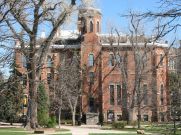David Gordon, senior fellow at the Ludwig von Mises Institute, has conducted a major study of books published by Harvard University Press from 2000-2010. His study, printed in the January 2011 issue of Econ Journal Watch, surveys the 494 books published during those 10+ years that have at least some political bias. The books surveyed are in five fields: Business and Economics; History; Philosophy; Political Science; and Sociology.
The 20-page report and attached spreadsheets (compiled by Per Nilsson) noting the classification of each book show offer concrete data on the ideological slant of books published by Harvard University Press, one of the world’s most respected publishers of academic work. Gordon’s findings show that of the 494 books, only 8 (1.6 percent) had a perspective that was conspicuously either classical liberal or conservative. On the other hand, 198 (40 percent), were found to be written from a conspicuously left or communitarian perspective.
Gordon wrote in the report, “In an effort to counter possible bias that might result from my own classical liberal orientation, I tried whenever possible to put books in the ‘Classical liberal’ and ‘Conservative’ categories. We wished to avoid ‘proving’ that Harvard tends left by wrongly coding books as leftist.” He invited readers who detected bias in his work to write to the journal.
One question this study raises is whether Harvard U Press’s ideological slant contributes to the difficulty many conservative academics face in securing employment and tenure. As the abstract says, “The results are important for debates about whether academic standards—“Has the candidate published a book with a leading university press?”—are themselves ideologically biased.”
On the NAS blog, George Leef quotes Gordon commenting on university presses: “My impression is that many, if not most, of the prestigious university presses tilt heavily to the left. It would be useful if someone made a thorough investigation of the most prestigious university presses. Such an investigation would make a good book project — though probably not one with much chance at HUP.” The report by Gordon, and a similar one John B. Parrott did of Yale University Press, published in Academic Questions last year, are a solid start to such a thorough investigation.
This study resonates with the work of the National Association of Scholars; we believe scholarship should be conducted in the spirit of open inquiry rather than ideological selection. We conducted our own book study last year of books assigned to college freshmen as summer reading. Our classification of the books was by theme. We did make a rough estimate of how they could be classified politically (about 70% from a liberal point of view; less than 2% from a conservative point of view), but our main task was to identify patterns in the books’ content and level of difficulty. Of the 184 books in our “Beach Books” study, 63 focused on multiculturalism, immigration, or racism. Only 8 were classic texts. Look for our 2011 report this summer.
Correction: An earlier version of this article states that David Gordon is president of the New York affiliate of NAS. In fact, the NYAS president and the author of the Harvard University Press study are two separate individuals.













